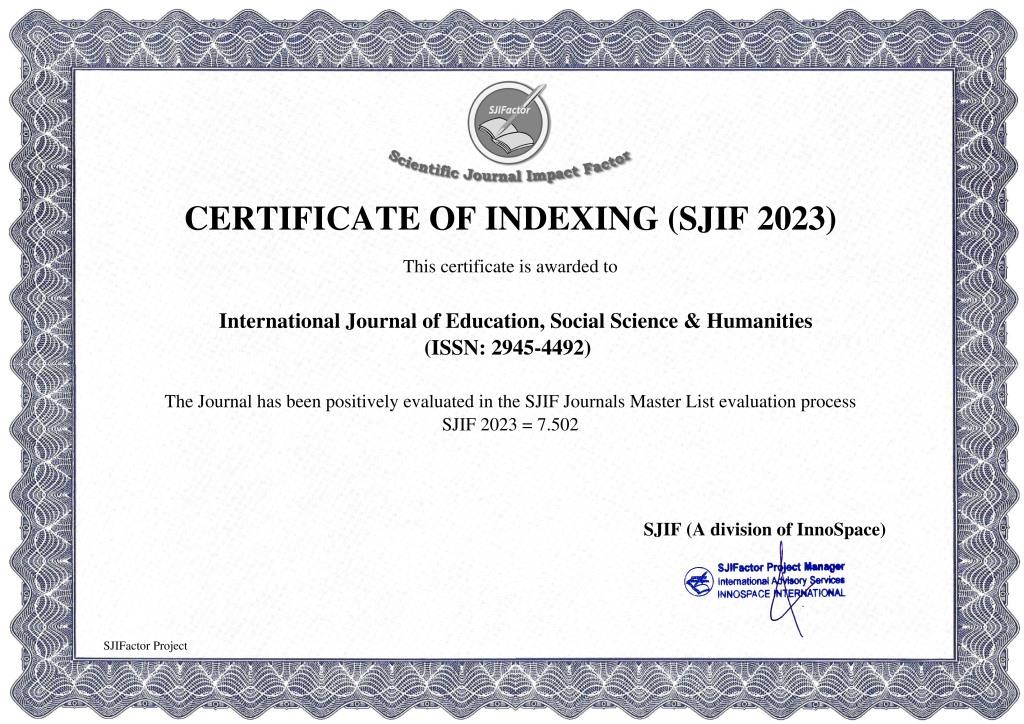THE INFLUENCE OF INTERNET TECHNOLOGIES ON THE VALUE ORIENTATIONS OF YOUNG PEOPLE IN THE MODERN WORLD.
Keywords:
information space, socialization, communication and technologies, specific knowledge.Abstract
In this article is about. the digital and media revolutions are closely related to global changes in society, which are expressed in the revision of social goals and values, changes in group and interpersonal communication models, transformation of political, economic, environmental, and cultural concepts that have developed in the world community. These trends could not but be reflected in the youth environment, which is the most mobile and receptive to all kinds of innovations. Appealing to young people and their inner potential has recently become increasingly relevant. The media culture of a young person, which is formed as a result of media education, is extremely important in this process. Proponents of computerization of leisure note the constructive significance of its following aspects:
- it is more often transferred to the home environment and becomes more independent of social forms of organization, enriches itself, and becomes freer;
- individual development receives new opportunities: new information and new knowledge become available, a person with the help of a game can be transported to the past and future;
- screen tools allow you to simulate difficult life situations and master new technologies for overcoming them;
- the wide possibilities of computer modeling lead to the use of screen culture in the activities of leisure centers and cultural institutions, creating for users a new environment and original types of entertainment;
References
Гирич В.Л., Чуприна В.Н. Глобальное информационное пространство и проблема доступа к мировым информационным ресурсам. — [ЭР]. Режим доступа: http://www.rsl.ru/upload/mba2007/mbapdf (дата обращения 16.09.2015).
Данилов С.А. Риски и потенциал Интернет-социализации молодежи // Известия Саратов. ун-та. — Вып. — Т. 12. —Саратов, 2012. — С. 42–46.
Луман Н. Реальность масс-медиа: пер. с нем. А.Ю. Антоновского / Под ред. О.В. Кильдюшова. — [ЭР]. Режим доступа: http://gtmarket.ru/laboratory/basis/3001/3014 (дата обращения 10.2015).
Брайант Дж., Томпсон С. Основы воздействия СМИ. — [ЭР]. Режим доступа: http://www.psyoffice.ru/page,19,3890brajjant-dzhenningz-tompson-suzan.-osnovy.html (дата обращения 10.2015).
Юрьева Е.А. Разностороннее влияние социальных сетей интернета на социализацию молодежи / Е.А. Юрьева, С.А. Горошкина // Молодой ученый. — 2010. — № 7. — С. 297–300.
Интернет-коммуникации в Казахстане: степень мобилизационного потенциала (по результатам социологического исследования). — Алматы КИСИ при Президенте РК. 2014. — [ЭР]. Режим доступа: http://www.academia.edu/10401264 (дата обращения 11.2015).
Сембай А. Развитие казахоязычной сферы казахстанского сегмента Интернета. — Алматы: ВТСОМ.MEDIANET,— С. 114–139.
Arnett, J. J. (2000). Emerging Adulthood: A theory of development from the late teens through the twenties. American Psychologist, 55, 469–480.
Akdeniz, B. (2018). Kuşaklar Arasındaki Farklar. Doğu-Batı, 84, 128-129.
Mahiroğulları, A. (2005). Küreselleşmenin Kültürel Değerler Üzerindeki Etkisi. Sosyal Siyaset Konferansları, 54, 1275-1288.
Ibni Haldun University, Faculty of Law














